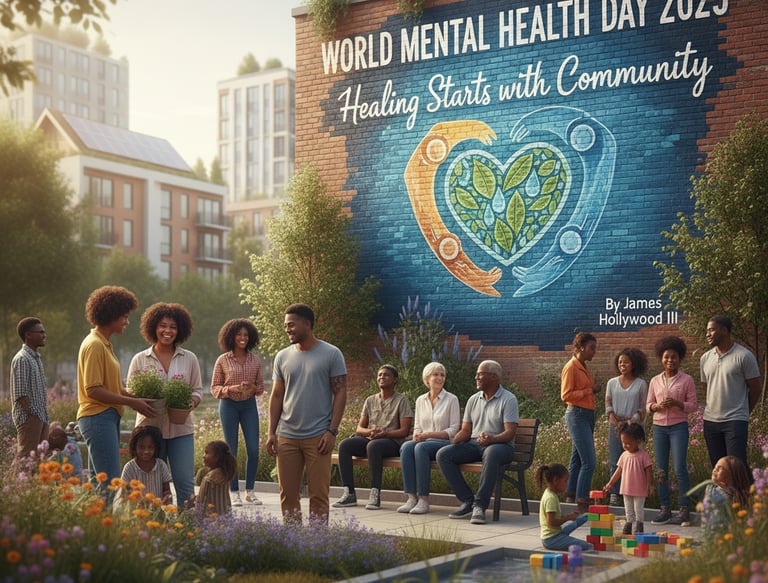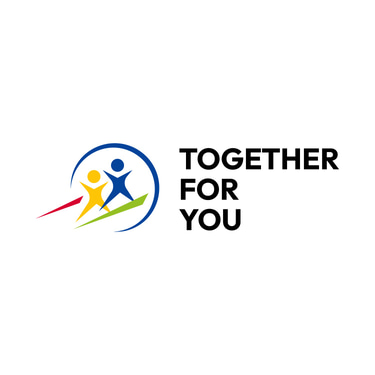World Mental Health Day 2025: Healing Starts with Community
Today is World Mental Health Day 2025, and the message is clear: Mental health is a universal human right, and healing starts with community. Stigma and systemic barriers keep nearly half of adults from getting the help they need. We need collective action to build true resilience. Read James Hollywood III's powerful call to prioritize connection, support caregivers, and fix the structural failures that leave people struggling in silence. #WorldMentalHealthDay #MentalHealthIsARight #CommunityHealth #HealingStartsHere
MENTAL HEALTH & VIOLENCE PREVENTIONHOUSING & CHILDCARECOMMUNITY RESILIENCEYOUTH & FAMILIESTOGETHER FOR YOU INSIGHTSGLOBAL PARTNERSHIPSSUSTAINABLE DEVELOPMENT GOALS (SDGS)PEACE & CONFLICT PREVENTIONPOVERTY & INEQUITY
James Hollywood III
10/10/20253 min read


World Mental Health Day 2025: Healing Starts with Community
By James Hollywood III, Together for You, Inc.
Every year on October 10, the world takes a moment to recognize World Mental Health Day, reminding us that mental well-being isn't a privilege; it's a universal human right. The World Health Organization's 2025 theme, "Mental Health is a Universal Human Right," is more than a slogan. It’s a challenge to tear down the walls that keep people from living healthy, meaningful lives (World Health Organization, 2025). The challenge to achieve collective well-being is also recognized globally, forming a key part of the United Nations Sustainable Development Goal 3, which aims to "Ensure healthy lives and promote well-being for all at all ages" (United Nations, n.d.).
Millions of people around the globe are still struggling in silence. You see it everywhere: the parents juggling exhaustion and caregiving, the child overwhelmed by digital life, the elderly person facing deep isolation, and whole neighborhoods reeling from trauma. The truth is simple, but we must face it: we can't have a healthy community without mental health.
It Starts at Home
Families are the first and often hardest testing ground for mental health. When one person struggles, the whole house feels it. A parent dealing with depression or anxiety might find basic daily life overwhelming. Kids pick up on tension they can't name. Spouses and caregivers carry an invisible weight of fear and fatigue.
Healing at home needs more than just a trip to the doctor; it requires compassion, honesty, and a safe place to talk openly. It begins with small, doable things: truly listening without judging, making sure people get a chance to rest, and accepting that needing support isn't a weakness, it's just part of being human. As our schools, churches, and workplaces create spaces where people feel safe talking, stigma breaks down, and strength builds up.
Rebuilding Our Village
The health of our communities is just a reflection of the people who live there. When we ignore mental health needs, trust fades, violence often rises, and everything slows down. But when people feel seen, connected, and supported, social bonds strengthen and hope returns.
Local organizations are the true lifelines. These groups, often small and volunteer-led, work to expand access to mental health support, mentorship, and purpose-driven programs, connecting well-being to a sense of belonging. Through community centers, advocacy, and localized networks, we are actively rebuilding the village. We must create networks, both digital and in-person, that connect families with essential resources, supportive mentors, and professional care. Our goal is clear: no one should ever have to walk this path alone.
The Real Problem: Systemic Walls
Despite all our efforts, huge barriers remain. Almost half of U.S. adults with a mental health condition don't get any treatment (National Institute of Mental Health, 2024), primarily because of high costs or a lack of available providers. Stigma is still a powerful force that stops people from seeking help, especially in communities of color and among men, where cultural norms discourage showing emotional vulnerability (Centers for Disease Control and Prevention, 2025). Plus, our systems are fractured: housing, education, and healthcare all operate separately, making it nearly impossible to get seamless care.
These are not individual shortcomings; these are systemic failures. They are choices we’ve made as a society, and we can change them through collective will and focused investment.
Making Prevention Our Priority
Real, lasting change happens when we all make prevention a priority.
Schools and workplaces should teach emotional literacy with the same focus they put on math or professional skills.
People who have lived experience with mental illness should be the ones helping to design programs and shape policy; they are the bridge between a bureaucracy and real life.
We must invest in connections. Parks, libraries, and community centers aren't nice extras; they are critical infrastructure that help people feel they belong.
Finally, let’s not forget the caregivers, the teachers, nurses, social workers, and parents, who need care themselves. Supporting the supporters is key to long-term community resilience.
World Mental Health Day is more than a calendar date; it’s a mirror showing us what we truly value. It forces us to ask whether our priorities align with our belief that everyone deserves to feel well. Governments need to invest in treatment and prevention as seriously as they invest in roads. Organizations must lead with compassion and bake mental health into their culture. And as individuals, we must choose to see, listen, and stand alongside those who are hurting or challenged.
Healing begins with one conversation, but it becomes unstoppable through community. Mental health is everyone's responsibility. To move forward, we need courage, empathy, and solidarity, the three things that can rebuild our foundation of hope.
References
Centers for Disease Control and Prevention. (2025, June 9). Mental health stigma. CDC. https://www.cdc.gov/mental-health/stigma
National Institute of Mental Health. (2024). Prevalence of Mental Illness. https://www.nimh.nih.gov/health/statistics/mental-illness
United Nations. (n.d.). Goal 3: Ensure healthy lives and promote well-being for all at all ages. United Nations Sustainable Development Goals. https://sdgs.un.org/goals/goal3
World Health Organization. (2025, March 25). New WHO guidance calls for urgent transformation of mental health policies. Geneva, Switzerland. https://www.who.int/news/item/25-03-2025-new-who-guidance-calls-for-urgent-transformation-of-mental-health-policies
